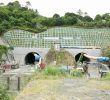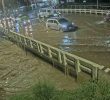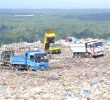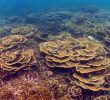“This typhoon would not have been this tragic if not for the logging and foreign mining companies ravaging our mineral resources,” Sr. Stella Matutina, convener of Manilakbayan said.
By ALEX D. LOPEZ
Davao Today
MANILA, Philippines — Conveners of the Manilakbayan (Journey to Manila) campaign for environment and human rights in Mindanao hold mining companies accountable for the devastation wrought by storm Pablo in the island.
“This typhoon would not have been this tragic if not for the logging and foreign mining companies ravaging our mineral resources,” Sr. Stella Matutina, convener of Manilakbayan said.
Matutina refers to large-scale mining companies, as small scale mining activities, she cited, “have been practicing sustainable mining.”
Matutina and 70 other indigenous peoples, tribal leaders and victims of human rights violations are here in Manila for a series of activities to call to stop foreign large scale destructive mining and agribusiness plantations in Mindanao.
Dulphing Ogan, a Blaan leader from Sarangani, who is one of the delegates of Manilakbayan, said it is mining that have aggravated the disasters which resulted to massive deaths and destruction of typhoon Pablo.
Typhoon Pablo which affected Davao Region the most has claimed 322 lives as of Thursday’s count of the Provincial Disaster and Risk Reduction Management Councils (PDRRMCs) of Davao Oriental and Compostela Valley, while hundreds are still believed missing in mining-ravaged provinces of Davao Oriental and Compostela Valley. Most of these deaths are caused by flashfloods and landslides.
Individuals directly affected by the disaster have reached 637,366 in Compostela Valley, and 486, 104 in Davao Oriental, while a total of 121,294 persons from both provinces are in evacuation centers, the data from the PDRRMCs of Davao Oriental and Compostela Valley cited.
Manay, Baganga, Boston, Tarragona, Cateel and Caraga towns in Davao Oriental, and Monkayo, Montevista, Mawab, New Bataan, Pantukan, Nabunturan, Maragusan, Maco, Mabini, Laak and Compostela in Compostela Valley province, where deaths have occurred due to flashfloods are towns that are heavily mined.
Based on data from environmental group Panalipdan Southern Mindanao, one of the convening groups of Manilakbayan, in New Bataan, Compostela Valley alone, there are five companies mining of gold, silver and copper resources over an area of 13, 557 hectares; eight companies mining gold, copper, manganese and nickel in over 52, 062 hectares in Baganga; five companies over 25, 366 hectares gold, copper, chromite, nickeliferous and laterite in Cateel; and seven mining companies covering 49, 966 gold and copper in Boston, all in Davao Oriental.
“We have long called to stop these activities that leave adverse impact to the environment and agricultural lands in Mindanao. But our calls have fallen on deaf ears until recent disasters have shown the extent of their destruction,” Ogan said.
Ogan also laments that while it is the people “who face the consequences of greed from multinationals for our lands and resources,” leaders of indigenous communities who bar the entry of destructive large-scale mining have also become victims of attacks instigated by mining companies in collusion with the military right in their ancestral land.
Ogan cited that 35 environment defenders, 26 of whom are lumads (Mindanao indigenous peoples) opposed the entry of foreign large-scale mining in their areas, have been killed since 2010.
Mining companies who use elements of state security agents to press their interests in resource-rich ancestral lands, he added, have wreaked much havoc and destruction similar to that caused by typhoons.
Ogan said that from June 2010 to October 2012, 1,017 families or a total of 5, 725 residents in lumad lands have been displaced from their communities due to military operations instigated in their communities along with the entry of large-scale mining and other “development aggression” projects.
In light of the devastation that typhoon Pablo caused in Mindanao, Ogan calls on President Benigno Aquino III to “stop the liberalization and the sellout of ancestral lands of the Lumads for large-scale mining and other big multinational companies” to avert further disasters.
“Nanghinaut ko nga dili unta matabunan sa ‘Pablo’ ang atong issue nga ginadala dinhi. Nag-awhag ko sa media nga balansehon pagtan-aw ang panghitabo, nga ang epekto ni Pablo tungod kana sa pagkadaut sa atong kinaiyahan nga gidala sa dagkong pagmina, mga plantasyon ug uban pang negosyo sa mga langyaw (I hope ‘Pablo’ will not overshadow the issues that we advocate here. I call on the media to look through the fact that ‘Pablo’ is aggravated by the destruction of our environment carried out by large-scale mining, plantations and other businesses by foreign investors),” Datu Nilo Cabungcal from Bukidnon said in an interview by davaotoday.com.
He added that ‘Manilakbayan’ must continue to achieve its objectives, among them is to inform the people in Manila about the plight of the people in Mindanao.
He said informed people of Manila could help ‘Manilakbayan’ pressure the government to stop environmental plunders in Mindanao and the killings of those who work to protect the land and environment.
Manilakbayan is on its sixth day of massive campaign here, staging pickets and rallies in strategic venues and appearing in group discussions and forums participated by different sectors.
The activity kicked-off on December 1 and will end on December 10 in observance of the International Human Rights Day. (Alex D. Lopez, davaotoday.com)
Extrajudicial Killings









